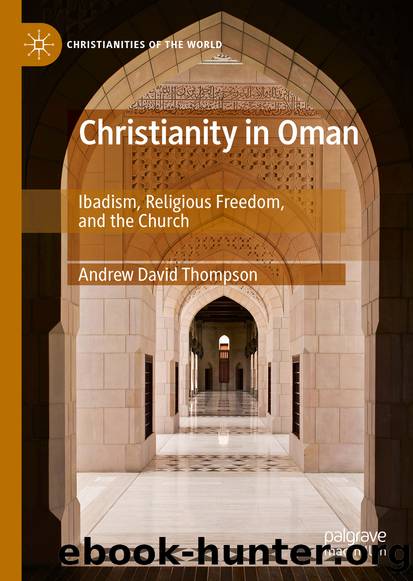Christianity in Oman by Andrew David Thompson

Author:Andrew David Thompson
Language: eng
Format: epub
ISBN: 9783030303983
Publisher: Springer International Publishing
The Portuguese
In 1507, the notorious Alfonso De Albuquerque of the Portuguese Royal Navy landed in Muscat and Muttrah and, after a brutal invasion, built fortresses on the coast and deep into the interior of Oman.2
The presence of the Portuguese in the region was firmly linked to trade and colonial expansionism in the Indian Ocean. In the case of the Gulf region, trade was not the primary concern governing their relationship with the local Arabsârather it was protection, particularly from sea-going vessels which had the potential to disrupt the merchant ships of the Portuguese Navy. The Omanis in particular had the capacity to threaten Portuguese maritime interests and, as such, Alfonso De Albuquerque showed no mercy in destroying the boats and ships he found along the coast of the Arabian Peninsula.
At that time, the Omanisâ main maritime trading industry operated out of the deep harbour of Muscat, âtrading in slaves, dates, horses and cornâ.3 Before the discovery of oil, the production of dates was the main contributor to the economy in Oman, although the income it generated was nowhere close to the income generated by the oil industry.4 According to Philip Ward in his comprehensive text Travels in Oman, the Portuguese did not attempt to interfere with the religious beliefs and practices of the Omanis, but he went on to record that âthe Portuguese destroyed a beautiful wooden mosque and burned 34 shipsâ.5 Any supposed religious tolerance is undermined in further accounts, where the Portuguese anti-Islamic stance is revealed through their activity of ârazing over half of the mosques along the Muscat seaboardâ.6
Historical interpretations from non-Portuguese sources invariably expose the brutality of the Portuguese forces and there is little evidence to show any positive encounters with the local Arab population. Portuguese sources reveal dispassionate concern for the local Gulf Arabs and see their actions in the light of wider trading concerns and the glorification of the Portuguese Empire.
Ironically, the Portuguese were invited into Muscat by the local people in order to deal with what they perceived as a greater threatâthe Qawasim pirates from Ras Al Khaimah. The pirates had made their base in Muscat, and when Alfonso de Albuquerquediscovered that the pirates were using the deep and well protected harbour as a hideaway, he landed troops and cannons in a nearby village called Sidab and marched onto the city. The citizens of Muscat who were tired of the cruel pirates admitted the Portuguese into Muscat and helped the newcomers drive out or sink the pirate ships.7
Download
This site does not store any files on its server. We only index and link to content provided by other sites. Please contact the content providers to delete copyright contents if any and email us, we'll remove relevant links or contents immediately.
The Lost Art of Listening by Michael P. Nichols(7506)
Why I Am Not A Calvinist by Dr. Peter S. Ruckman(4153)
The Rosicrucians by Christopher McIntosh(3521)
Wicca: a guide for the solitary practitioner by Scott Cunningham(3179)
Signature in the Cell: DNA and the Evidence for Intelligent Design by Stephen C. Meyer(3138)
Real Sex by Lauren F. Winner(3023)
The Holy Spirit by Billy Graham(2953)
To Light a Sacred Flame by Silver RavenWolf(2824)
The End of Faith by Sam Harris(2742)
The Gnostic Gospels by Pagels Elaine(2532)
Waking Up by Sam Harris(2461)
Nine Parts of Desire by Geraldine Brooks(2370)
Jesus by Paul Johnson(2363)
Devil, The by Almond Philip C(2333)
The God delusion by Richard Dawkins(2309)
Heavens on Earth by Michael Shermer(2285)
Kundalini by Gopi Krishna(2185)
Chosen by God by R. C. Sproul(2165)
The Nature of Consciousness by Rupert Spira(2108)
